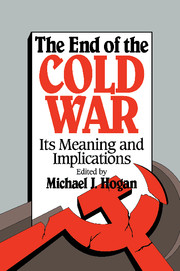Book contents
- Frontmatter
- Contents
- Preface
- The Authors
- Dedication
- 1 Introduction
- 2 An End to Which Cold War?
- 3 The Cold War, the Long Peace, and the Future
- 4 Quiet Cataclysm: Some Afterthoughts on World War III
- 5 Some Lessons from the Cold War
- 6 Nuclear Weapons and European Security during the Cold War
- 7 Victory in the Postwar Era: Despite the Cold War or Because of It?
- 8 The Wicked Witch of the West is Dead. Long Live the Wicked Witch of the East
- 9 The End and the Begining
- 10 A Balance Sheet: Lippmann, Kennan, and the Cold War
- 11 Why Did the Cold War Arise, and Why Did It End?
- 12 A View from Below
- 13 The End of the Cold War and the Middle East
- 14 The End of the Cold War in the Near East: What It Means for Historians and Policy Planners
- 15 After the Cold War: The United States, Germany, and European Security
- 16 The End of the Cold War: A Skeptical View
- 17 The End of the Cold War, the New Role for Europe, and the Decline of the United States
- 18 The Fading of the Cold War—and the Demystification of Twentieth-Century Issues
- 19 The U.S. Government, a Legacy of the Cold War
- 20 Foreign Policy, Partisan Politics, and the End of the Cold War
- 21 Beyond Bipolarity in Space and Time
- 22 A Usable Past for the Future
- Selective Bibliography
- Index
20 - Foreign Policy, Partisan Politics, and the End of the Cold War
Published online by Cambridge University Press: 18 December 2009
- Frontmatter
- Contents
- Preface
- The Authors
- Dedication
- 1 Introduction
- 2 An End to Which Cold War?
- 3 The Cold War, the Long Peace, and the Future
- 4 Quiet Cataclysm: Some Afterthoughts on World War III
- 5 Some Lessons from the Cold War
- 6 Nuclear Weapons and European Security during the Cold War
- 7 Victory in the Postwar Era: Despite the Cold War or Because of It?
- 8 The Wicked Witch of the West is Dead. Long Live the Wicked Witch of the East
- 9 The End and the Begining
- 10 A Balance Sheet: Lippmann, Kennan, and the Cold War
- 11 Why Did the Cold War Arise, and Why Did It End?
- 12 A View from Below
- 13 The End of the Cold War and the Middle East
- 14 The End of the Cold War in the Near East: What It Means for Historians and Policy Planners
- 15 After the Cold War: The United States, Germany, and European Security
- 16 The End of the Cold War: A Skeptical View
- 17 The End of the Cold War, the New Role for Europe, and the Decline of the United States
- 18 The Fading of the Cold War—and the Demystification of Twentieth-Century Issues
- 19 The U.S. Government, a Legacy of the Cold War
- 20 Foreign Policy, Partisan Politics, and the End of the Cold War
- 21 Beyond Bipolarity in Space and Time
- 22 A Usable Past for the Future
- Selective Bibliography
- Index
Summary
Does the end of the Cold War mean the end of the Cold War consensus? Since 1950, at the latest, the nation's foreign policy has taken shape within the framework of a basic political consensus. There were notable instances of dissent, to be sure, but the major political parties and their constituencies generally supported the policy of containment and the diplomatic and military initiatives it seemed to dictate. Will foreign policy become a matter of partisan conflict in the new era that is dawing? If so, what might be the sources of that conflict and how can it be contained? The answer to these and related questions must be speculative, of course, and must be informed by what we know about American history. With this in mind, let me begin by reviewing the historical record and then speculate about the likely influence of partisan politics on foreign policy in the time ahead.
If history is any guide, some such influence is inevitable. Since the founding of the Republic, foreign policy and partisan politics have been linked inextricably. The first political parties emerged in part because of partisan differences over the direction of American diplomacy. The War of 1812 brought these differences to a head, at one point threatening the very survival of the Union, and there were similar differences during the war with Mexico in 1848 and the Spanish-American War a half-century later. Woodrow Wilson's war to make the world safe for democracy also led to a bitter partisan battle over Senate ratification of the Versailles treaty. So great were the differences, so intense the animosity, that Wilson's strongest opponents were known asthe “irreconcilables,” the “bitter-enders, ”and the “battalion of death”.
- Type
- Chapter
- Information
- The End of the Cold WarIts Meaning and Implications, pp. 229 - 244Publisher: Cambridge University PressPrint publication year: 1992



